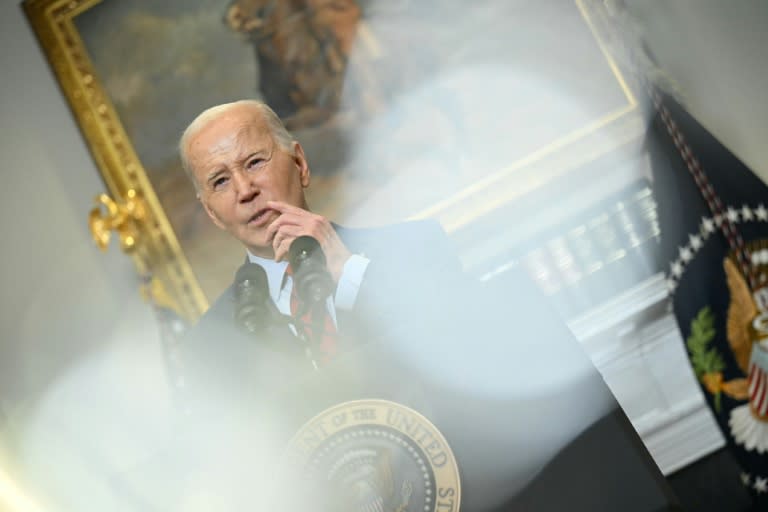After breaking silence, Biden faces balancing act on Gaza demos

Joe Biden broke his silence Thursday on the student protests against Israel's war with Hamas but the US president faces a difficult balancing act to avoid hurting his reelection chances against Donald Trump.
"There's the right to protest but not the right to cause chaos," the 81-year-old Democrat said in a televised address from the White House.
Biden took a tough, law-and-order tone after police broke up some of the protests that have rocked US college campuses, even as he insisted the United States would not "squash dissent."
"Vandalism, trespassing, breaking windows, shutting down campuses, forcing the cancellation of classes and graduations -- none of this is a peaceful protest," he said.
The president also doubled down on his support for Israel's offensive in Gaza since the October 7 attacks, which has helped fuel the campus anger and enraged many Muslim and younger voters.
"No," he said tersely when a journalist asked whether the demonstrations had forced him to reconsider any of his policies in the inflamed region, before turning on his heel.
Biden had largely avoided the contentious subject since the demonstrations began several weeks ago.
His remarks were his first in public since police started cracking down on the protests at the weekend -- and it was just the second time he'd addressed them at all.
"I condemn the anti-Semitic protests. That's why I have set up a program to deal with that," Biden said last week. "I also condemn those who don't understand what's going on with the Palestinians."
Biden's reluctance to weigh in on the biggest and most prolonged unrest to rock US campuses since the Vietnam war protests of the 1960s and 70s has not gone unnoticed by Trump and the Republicans.
"There's a big fever in our country, and he's not talking," the 77-year-old former president told a campaign rally Wednesday.
Republicans have accused Biden of being soft on anti-Semitism by refusing to condemn the pro-Palestinian demonstrators.
Trump urged college presidents to "remove the encampments immediately, vanquish the radicals and take back our campuses." As for the demonstrators at New York's prestigious Columbia University, he called them "raging lunatics and Hamas sympathizers."
- 'Difficult spot' -
Biden tried to counter that by insisting there was "no place in America for anti-Semitism or threats of violence against Jewish students."
He also condemned all kinds of hate speech, including against Muslims.
The White House on Thursday denied that Biden had been pushed into reacting by Trump.
"The president, when it comes to something like this, he doesn't need to follow anyone," White House Press Secretary Karine Jean-Pierre told reporters on Air Force One on a Biden campaign trip to North Carolina after his remarks.
But the balancing act is not easy for Biden.
"The protests put Biden in a difficult spot because for his coalition of voters from 2020 he relied heavily on young people, in addition to Muslims and Arab Americans," said Alex Keena, who teaches political science at Virginia Commonwealth University.
James Zogby, president of the Arab American Institute, said the White House is "apparently convinced that they'll weather this storm and still defeat Donald Trump in November."
He added: "This is a dangerous miscalculation."
When Biden travels, he is often met by demonstrators chanting "Genocide Joe" and demanding a ceasefire.
Biden could still win back the hearts of some young voters, if a ceasefire agreement coupled with the release of hostages held in Gaza is reached between Hamas and Israel.
"If there is a ceasefire, that would be huge," said Keena.
If the agreement falls through and campus unrest continues, that would cloud the Democratic National Convention in August in Chicago, where Biden will be officially nominated for president.
In 1968, police clashes with demonstrators protesting against the Vietnam war marred the Democratic National Convention in Chicago after president Lyndon Johnson decided not to run for re-election.
At the time, Biden, a law student and centrist, stayed away from the protests. In a book published in 2007, he describes seeing students occupying a building at his university and thinking "Look at these assholes."
aue-dk/mlm


